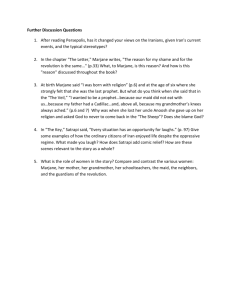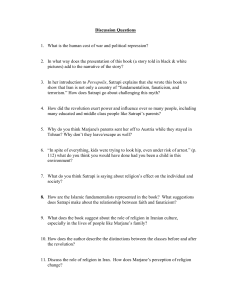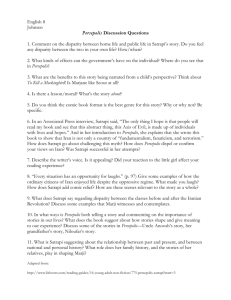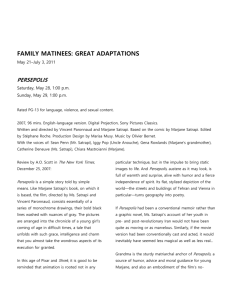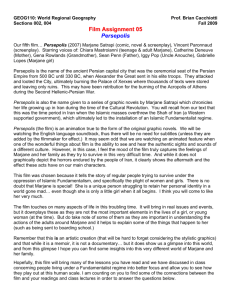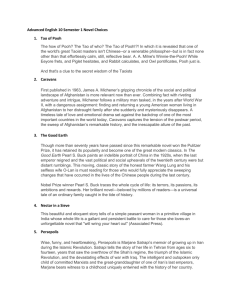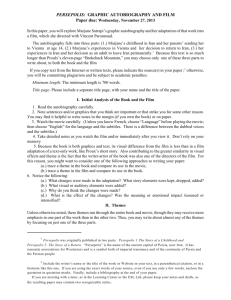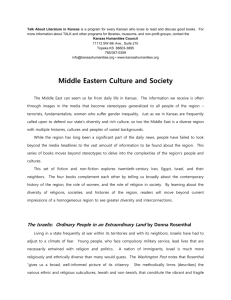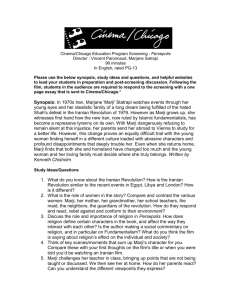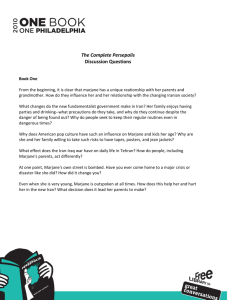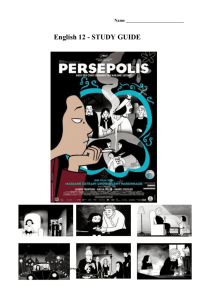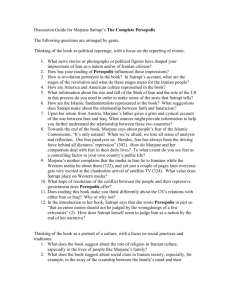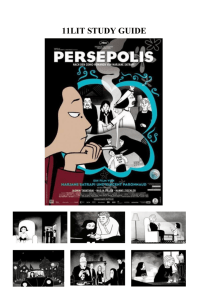We are going to watch the animated feature film “Persopolis”
advertisement
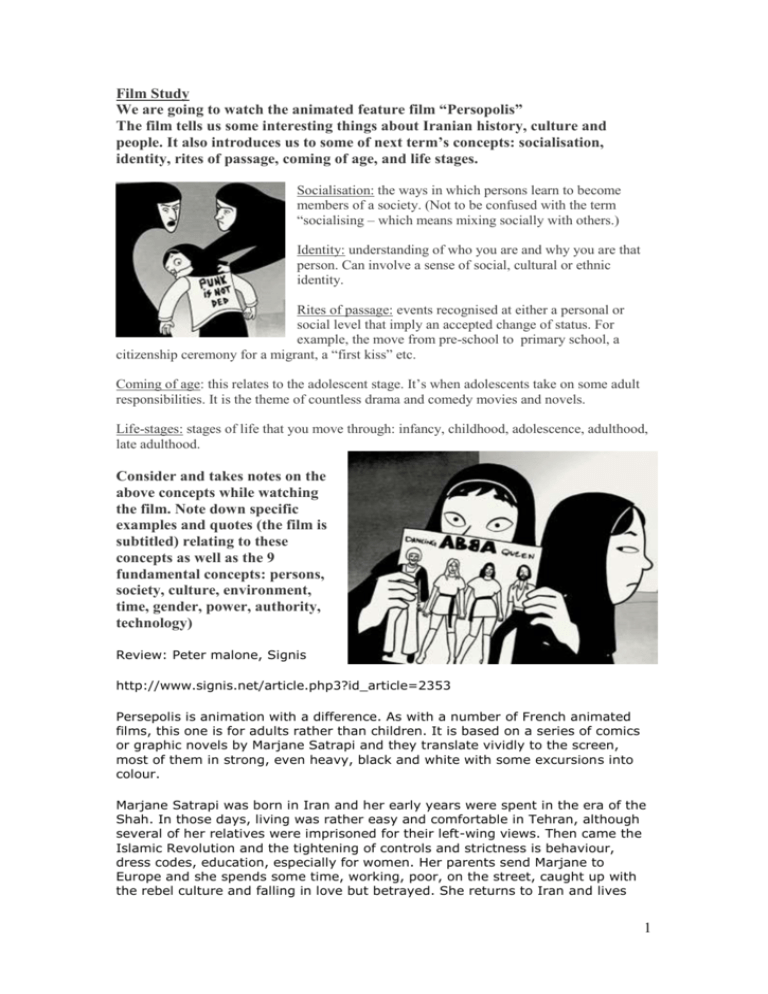
Film Study We are going to watch the animated feature film “Persopolis” The film tells us some interesting things about Iranian history, culture and people. It also introduces us to some of next term’s concepts: socialisation, identity, rites of passage, coming of age, and life stages. Socialisation: the ways in which persons learn to become members of a society. (Not to be confused with the term “socialising – which means mixing socially with others.) Identity: understanding of who you are and why you are that person. Can involve a sense of social, cultural or ethnic identity. Rites of passage: events recognised at either a personal or social level that imply an accepted change of status. For example, the move from pre-school to primary school, a citizenship ceremony for a migrant, a “first kiss” etc. Coming of age: this relates to the adolescent stage. It’s when adolescents take on some adult responsibilities. It is the theme of countless drama and comedy movies and novels. Life-stages: stages of life that you move through: infancy, childhood, adolescence, adulthood, late adulthood. Consider and takes notes on the above concepts while watching the film. Note down specific examples and quotes (the film is subtitled) relating to these concepts as well as the 9 fundamental concepts: persons, society, culture, environment, time, gender, power, authority, technology) Review: Peter malone, Signis http://www.signis.net/article.php3?id_article=2353 Persepolis is animation with a difference. As with a number of French animated films, this one is for adults rather than children. It is based on a series of comics or graphic novels by Marjane Satrapi and they translate vividly to the screen, most of them in strong, even heavy, black and white with some excursions into colour. Marjane Satrapi was born in Iran and her early years were spent in the era of the Shah. In those days, living was rather easy and comfortable in Tehran, although several of her relatives were imprisoned for their left-wing views. Then came the Islamic Revolution and the tightening of controls and strictness is behaviour, dress codes, education, especially for women. Her parents send Marjane to Europe and she spends some time, working, poor, on the street, caught up with the rebel culture and falling in love but betrayed. She returns to Iran and lives 1 through the restrictions of more recent years with her parents and her wise grandmother. But Marjane needs more space and freedom and she leaves. Catherine Deneuve and Chiara Mastroianni (Catherine Deneuve’s daughter) voice mother and daughter in both the French version and the American-dubbed version. (Sean Penn and Gena Rowlands also feature in the American version.) The film won many awards including the Jury award in Cannes 2007 eliciting protests from the Iranian authorities. Highbeam Research Abstract for “Why I wrote Persopolis, a graphical novel memoir”, Satrapi, Marjane published in Writing! November 1, 2003 Marjane Satrapi was born in Rasht, Iran, in 1969-which means she was ten when the revolution of 1979 transformed Iran into an Islamic republic. She lived for years in Tehran, Iran's capital city, under the repressive regime of the late Ayatollah Ruhollah Khomeini and other Islamic extremist leaders. A free spirit, Marjane chafed under the restrictions that were placed on young people, especially girls, including the edict that all women must wear veils and chadors (long shawls or cloaks) and that girls' education be limited. She also rebelled against the censorship that barred young Iranians from music, entertainment, and other aspects of American and Western culture. Earlier this year, Marjane, now living in the United States, published Persepolis, a memoir in the form of a graphic novel. Persepolis (the name of the capital of the ancient Persian empire) has been widely praised by readers and other authors, including Sandra Cisneros and Phillip Pullman. Writer and editor Gloria Steinem captured the unique quality of Persepolis: "the intimacy of a memoir, the irresistibility of a comic book, and the political depth of the conflict between fundamentalism and democracy." In this brief essay, Marjane Satrapi writes about how using the graphic novel helped her tell her story with great impact. From the time I came to France in 1994, I was always telling stories about life in Iran to my friends. We'd see pieces about Iran on television, but they didn't represent my experience at all. Marjane Satrapi at Cannes: An Iranian graphic novelist's coming of age By Joan Dupont, Tuesday, May 22, 2007 NEW YORK TIMES, The film "Persepolis," screening at the Cannes festival in competition, was adapted by Marjane Satrapi and Vincent Paronnaud from Satrapi's black and white graphic novels. The movie, in French, is something new in an art form that is spinning in all directions. "I never saw it as a cartoon," the artist said in an interview. The artwork had to be in black and white, and the characters are never cute. There are none of the usual special effects - cars don't talk, Spidermen don't fly. But it is funny, imaginative, and sad, bringing the famous books to life. At Cannes, the animated film in black and white may not be viewed with pleasure by all. There has been word that the Iranian authorities are not pleased. 2 The visual diaries depict an Iranian girl's life, growing up under several regimes and revolutions, the rise of the mullahs, the imposition of the veil. It is a dark past, a hard story. But it is also a movie of surprises: there's the striking art work, but also the tempo, fantasy, and drama, and the young author's forceful point of view. The best thing is the sense of real lives - her parents, uncle, grandmother, friends and enemies throbbing behind the images and voices. Chiara Mastroianni is the voice of the independent Marjane, Catherine Deneuve that of her worried mother, and Danielle Darrieux that of her irrepressible grandmother. "I just hope that I can find such good dubbing voices for the American version," Satrapi said. Meeting the author/artist at the bar of a Cannes hotel - our minutes are counted - is like meeting a friend. For she looks familiar, and we know so much about her through the books. The black hair, the mole by her nose are there - the cigarettes are on the table. She appears inhabited by a cast of characters. She speaks fast, ideas tumble out from a deep central intelligence. Her English is perhaps less fluent than her French, but it is pungent. In 15 minutes, you get her beliefs and contradictions, a sense of how she lives with herself and adapts on her journeys from Iran, to France, to America. "Even though I've published more books in the U.S., I felt that I could control the project better in France," she says. "I had this doubt about Hollywood; that they might do my project like another 'Not Without My Daughter,' a movie which would make Iranians look like crazy people, nicer maybe, not quite so Evil Empire, but a little." Yet, although she lives in Paris with her Swedish husband, she is not completely comfortable with the French. "I have this strange relationship with the French public: they always think they know stuff, and they do. But they don't always know the right things." There is, in fact, one of those mysterious cultural discrepancies: in France, she has a cult following; in the United States, she has caught on. And now that she knows American producers and distributors, through the success of her books, she has more trust. She is enthused by Michael Barker of Sony Classics, the studio that will be releasing "Persepolis" in the United States: "Can you imagine, a business man who teaches cinema at NYU!" she said, referring to New York University. She was also smitten with Kathleen Kennedy, who coproduced the movie. "Kathleen Kennedy liked the story so much. We met in L.A. and she's such a busy lady, I said 'I really don't know how to thank you.' She told me, 'Make a good movie; that's the best thanks.' " Since Satrapi's American success - she went over for the first time in 1999, and again in 2001 - she feels more comfortable. "In the '70s, we grew up with American culture - bowling with my cousins, the music, hamburgers, pizza like in Chicago. Nobody can believe how many parallels between where I come from and America countries that are not very friendly these days. But now that I know the country and have done so many book tours, I think, how stupid we are to make these clichés about America." Her eagle eye - the same one she depicts in her books - lights up, an eye she trains on others, and on herself. "We are all so stupid, prejudiced and unjust to each other." Satrapi has lived dramatic times, successive regimes, censorship and fear at least, her parents' fears for her. "And I was lucky to have the grandmother I had: she was very straightforward, and she 3 loved justice so much that she could be completely unjust. She never lied. "I love old people. I heard incredible stories, and the things that other people don't like in old people, I love. They told me lots of stories, I couldn't get enough. And I loved being the only child, never wanted a brother or sister." Marjane, the rebel, the independent spirit, is in the movie, confiding in her grandmother, visiting her favorite uncle in jail, on the eve of his death, egging her friends on to punish evildoers. She says that she always drew and told stories. "And I was good at school, at math. My father was an engineer and they thought that I would become an engineer. But I didn't become an engineer. I was told that my stories were lies. I never understood that: a lie is to benefit from something, but if you tell a beautiful story, it's just beautiful." When she was 10, the veil was imposed on young girls. "I had to wear it at school. For years, I had been playing soccer with the boys from school, and one day I saw they took another goalie. "They said, 'We won't play soccer with you any more because you're a girl.' For five years they hadn't noticed, and then they realized their goalie was a girl! So I went and did karate." She shrugged. Her parents, she said, didn't bring her up as a girl - "that femininity thing: I have always been treated like a human being. They never said, you have to act like a girl. And, very early, I understood that I didn't have to justify myself. You always have choices, and you can't lie to yourself. I'm not looking for perfection," she added. She talked about how, in ancient Greece, the gods were not perfect. "They were making love and drinking and burping," she said, laughing. "And people adored these imperfect gods: if the gods could be imperfect, then they could be imperfect. The search for perfection will always make us feel guilty, and our cultures, both East and West, share that guilt." Satrapi identifies herself as somebody who sits between East and West. "I situate myself, between the two: I was Iranian and I wanted so much to become a Westerner it make life hard for me." This is the struggle that we see in the movie: Marjane in Vienna, trying to play it cool, starving for a crumb of recognition, and then, starving on the streets, a little matchgirl in the snow, rejected by the nuns, and her peers. "I saw that you can be two things, and three and four different things. It's not so comfortable when you are sitting between two or three chairs, but you do have three chairs instead of one." Since the books were published, she has not gone back to Iran. "The problem is that Iran is not a state of law, so you don't know what will happen. My family come and go. They have never punished the families - not since a brief period after the revolution." She lives in the Marais district, and loves going to the movies in Paris - "you can see everything." She said that the German Expressionists have influenced her work Fritz Lang, Murnau. And you can detect the shadow of Murnau over her characters in the haunting black and white imagery. "I also love Tarantino's 'Jackie Brown' and Abbas Kiarostami," she said. Told that she was brave to have turned her intimate life into images, she responded, "My point of view is subjective, I don't pretend it's not. It's best to talk in my own name. If you try to talk in terms of a people, nationality, a culture, it doesn't mean anything. But when you talk about one person, this person can be anybody. I don't know another way of working. I try to be free, I try to do my best." 4
